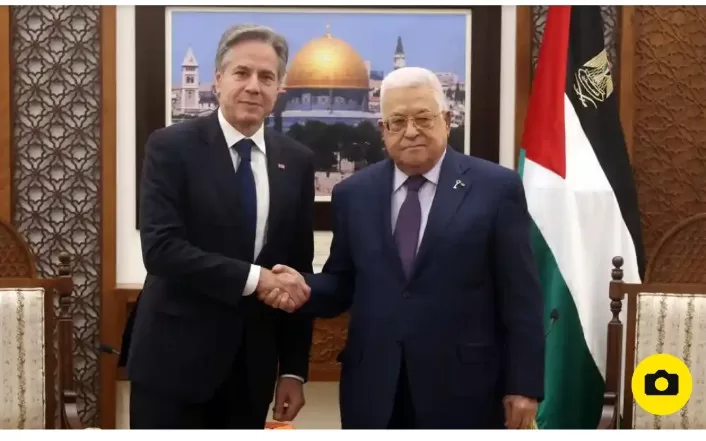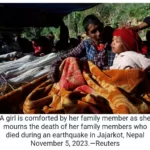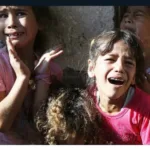Israeli airstrikes targeted a refugee camp in the Gaza Strip, resulting in the tragic loss of at least 38 lives and causing injuries to numerous others, as reported by officials from Gaza’s health ministry, controlled by Hamas.
While Israel has not officially confirmed its role in the strike on Al-Maghazi camp, a military spokesperson has stated that an investigation is underway to determine the circumstances of the bombing.
This strike occurred in conjunction with the unannounced visit of the US Secretary of State, Antony Blinken, who held discussions with Palestinian President Mahmoud Abbas in Ramallah. Following the meeting, a spokesperson for Abbas conveyed the urgent need for an immediate ceasefire and the delivery of essential humanitarian aid to Gaza.
The US State Department’s spokesperson, Matthew Miller, emphasized Blinken’s commitment to delivering life-saving humanitarian assistance and restoring vital services in Gaza, making it clear that Palestinian civilians must not be subjected to forced displacement.
In their discussions, Blinken and Abbas addressed the imperative of reestablishing tranquility and stability in the West Bank. This entailed the need to counter extremist violence against Palestinians and ensure accountability for those responsible, with particular reference to acts committed by Israeli settlers.
Meanwhile, the evacuation of civilians and critically injured Palestinians from Gaza has been suspended since an Israeli strike on ambulances near the entrance to Gaza City’s main Dar al-Shifa hospital on Saturday. Israel later asserted that Hamas had been using an ambulance for transporting its fighters.
This conflict has been marked by the attempt by both Israel and Hamas to promote their diverging narratives. To that end, the Israel Defence Forces facilitated a limited visit for a select group of foreign and Israeli journalists to Gaza over the weekend.
In contrast to the 2014 conflict, where international media outlets were allowed access to Gaza from Israel, reporters have been unable to enter the region during the present conflict, either from Israel or Egypt. Furthermore, several Palestinian journalists operating within Gaza have lost their lives in Israeli attacks.
The Committee to Protect Journalists has reported that more media workers have perished in the Israel-Hamas war than in any other conflict in the area since they began monitoring in 1992. As of Friday, 36 media workers, including 31 Palestinians, four Israelis, and one Lebanese journalist, had lost their lives since the commencement of hostilities on October 7.
The escalating death toll in Gaza has led to mounting international outrage, with mass protests occurring from Washington to Berlin, demanding an immediate ceasefire.
On Sunday, the French foreign minister, Catherine Colonna, remarked in Doha that too many civilians have suffered in Israeli strikes on Gaza. She underscored the need to protect schools, hospitals, humanitarian workers, and journalists.
Israel, however, has rejected the idea of a temporary halt to its offensive, asserting that Hamas is currently facing the full strength of its forces.
In the Maghazi refugee camp in central Gaza, which was struck overnight, scenes of first responders and residents sifting through the rubble in search of survivors were witnessed. Journalists reported that they observed the bodies of at least five children, including an infant, who had been rescued from the debris.
One resident of the camp described the Israeli airstrike as a true massacre, emphasizing that the people there were primarily peaceful civilians. The widespread devastation has left the residents in dire need of food and shelter.
Blinken’s visit transpired after his meetings with Arab foreign ministers in Jordan and discussions with Israeli Prime Minister Benjamin Netanyahu, who insisted on the release of all hostages held by Hamas before any consideration of a temporary ceasefire.
While Jordan’s foreign minister, Ayman Safadi, stated that Arab nations were advocating for an immediate ceasefire, Blinken expressed concerns that a ceasefire could merely provide Hamas with the opportunity to regroup and recommence hostilities, citing their actions on October 7 as an example.
He suggested that humanitarian pauses could be pivotal in safeguarding civilians, facilitating the delivery of aid, and the evacuation of foreign nationals, all while enabling Israel to accomplish its objectives, including the defeat of Hamas.
Israel’s Defense Minister, Yoav Gallant, warned that anyone remaining in Gaza City was at grave risk due to the ongoing hostilities.
In the Maghazi refugee camp, which was the recent target of an Israeli airstrike, residents and first responders are continuing their efforts to locate survivors amidst the debris, underscoring the dire humanitarian situation in Gaza.
The situation remains complex, with both sides of the conflict firmly entrenched in their positions, leaving the prospects for a swift resolution uncertain.






